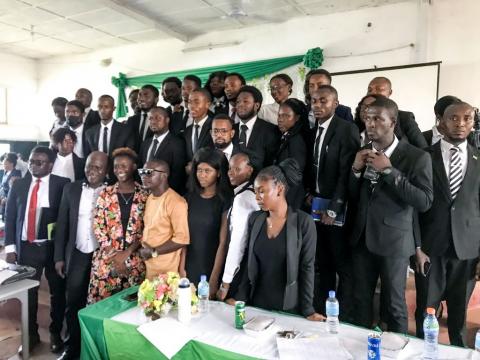By Nasratu Kargbo
Some law students at Fourah Bay College (FBC) University of Sierra Leone have highlighted the strength and weaknesses of the Cyber Security Act of 2020 which according to them infringes on human rights.
One of the students, Nancy Brenda F. Junisa in her presentation at the E.J hall at FBC campus on Saturday 21st August 2021 said the Act does not meet the Budapest and Malabo Convention, which serves as a threshold for cybercrime, data protection and cyber security laws. “The Act interferes with freedom of speech and freedom of expression,” she said. She cited section 39(2) of the Act. Junisa said this infringes on the freedom of expression and speech and that it goes against section (19) of the Universal Declaration of Human Rights and Section (9) of the African Charter of People and Human Right.
Comparing the Act to that of Kenya’s Computer Misuse and Cybercrime Act of 2018, Junisa said section 22 of Kenya’s Act states that: “ Pursuant to Article 24 of the constitution, the freedom of expression under Article 33 of the constitution shall in respect of intentional publication of false, misleading or fictitious data or misinformation that is (a) likely to (i )propagate (ii) incite persons to violence (b) constitutes hate speech, (c)advocates hatred that (i) constitutes ethnic incitement vilification of others or incitement to cause harm or (d) negatively affects the rights or reputation of others.” She said the provision gives specifications, whilst Sierra Leone’s Act is ambiguous with discrepancy in phrases like “ought to have known” and what constitutes an “insult”, all grey areas. She said one might not know what would instill fear on another person or what an insult is. She also stated that the Malabo convention clearly states that any country that wants to enact a bill, which has to do with cyber security, should not infringe on the rights of free speech and freedom of expression.
Speaking on data protection and right to privacy Junisa said the Act infringes on one’s privacy because whether one is in the country or not, the police or authorized person can without “authorization, access people’s personal data located in a foreign state once the consent of the controller is sought”, this according to the group, is a violation of privacy rights. She said Kenya’s Act of 2018 initially infringed on the rights to privacy, but they corrected the mistake by enacting another bill named the data protection bill 2019, which serves as supplement to the lapses found in the 2018 bill. The 2019 bill makes it a crime for one to access one’s data without their consent. The threshold, which is the Malabo Convention, states that mechanism should be put in place to protect personal date.
She also spoke on the domination of political appointees in the Advisory Council. Junisa stated that the Act is yet to become law or gain the assent of the president. She therefore called on Sierra Leoneans to make recommendations in order for a law she claimed contravenes the right of freedom of expression and free speech, not to be approved as law.
Another presenter, Ishmaila Jalloh recommended that provisions be made that a crime should only be committed if a publication imposes threat on public safety, public order and security of the state.
Jalloh also stated that they recommend for the establishment of data protection authority that is tasked with specific responsibilities of regulating the collection, processing and storage of personal data. In addition, mechanisms be put in place to ensure adequate compensation be given to persons who suffer undue damages to personal data.
Copyright © 2021 Politico Online








